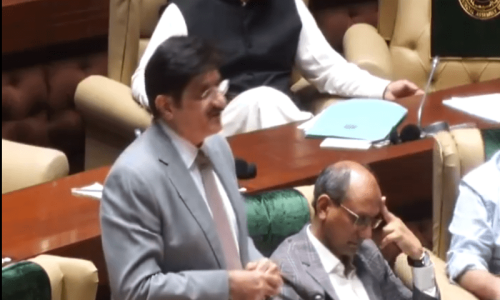KARACHI: Colonial forces in India equated the communist struggle with anti-culture, anti-religion and anti-civilisation movements which harmed communist and progressive movements in the subcontinent. This was argued by Dr Ali Raza in his talk at a webinar titled ‘The Unsung Heroes: Genealogies of Progressive and Leftist Struggle against British Colonialism’ organised by the Irtiqa Institute of Social Sciences as part of its Hamza Wahid Memorial Lecture series on Monday evening.
Dr Raza, who is a historian and associate professor at LUMS, based his arguments on his book Revolutionary Pasts: Communist Internationalism in Colonial India.
He said the starting point of his book was a memory. In that connection he narrated the story of a leading communist figure, Dada Amir Haider Khan, who in 1949 was arrested in Pakistan. “It’s a time when a new state has been formed and the first thing that the Muslim League government did was that it began keeping an eye on the communists and detained them. The same happened in India. In fact, there was a communist insurgency that took place in Telangana (formerly Hyderabad). The Communist Party was banned as well; it was banned in Pakistan in 1954.
The scholar said there were many anti-colonial movements which were after independence called or dubbed anti-state. This juncture was important. So an anti-imperialist movement became an anti-state one. The one argument that he [Dr Raza] spent time on in his book, he told the guests, was that he traced how communism and progressive ideology was not only considered anti-state, but also a foreign idea. Progressive movements were often accused of being some kind of Russian proxy, and that communist ideology did not belong to this part of the world. It was also labelled anti-religion, anti-local culture and anti-values.
Dr Raza claimed it wasn’t a new argument. It could be traced all the way back to the 1920s and 1930s when the British tried to ban the idea of communism (soch). It also banned and proscribed the Communist Party. The effort could be seen in a number of conspiracy cases which were formed against members of such movements. One such important case was the Meerut Conspiracy Case in which the government tried to ban the very idea of communism. They tried to prove that as a soch it had nothing to do with India. It could not take root in the subcontinent because it was against its culture, values and civilisation.
Interestingly, the lead prosecutor in the case, Langford James (who died of a heart attack in the courtroom which spoke for the longevity of the case), in one of his speeches in the courtroom linked communism with everything that was anti-religion, anti-family and anti-Indian. According to him, if politics could prosper in India, it had to have a religious colour. This argument for a communist movement proved damaging. It was the same argument that’s used in India and Pakistan after independence.
He underlined historians, too, were not far behind. All of this became part of our colonial archives suggesting communism was an ideology which had no relation with India.
‘Common man took communist movement forward’
Senior journalist and human rights activist Husain Naqi, presiding over the programme, said Dr Raza’s paper was important because he’s mentioned ours was the region from where the anti-colonial movement commenced. The scholar did justice to his research.
Mr Naqi said he was part of the communist movement as a worker (kaarkun) and pointed out that the movement was taken forward by the common man and was mistakenly attributed to the elites.
Ali Usman Qasmi moderated the event.
Rahat Saeed, earlier, informed the attendees about Hamza Wahid and the development of the Irtiqa Institute.
Before the commencement of the talk, some Indian individuals hacked into the system. They, employing foul language, tried to disrupt proceedings, but soon the organisers managed to get rid of them and control the situation.
Published in Dawn, March 4th, 2021














































Dear visitor, the comments section is undergoing an overhaul and will return soon.